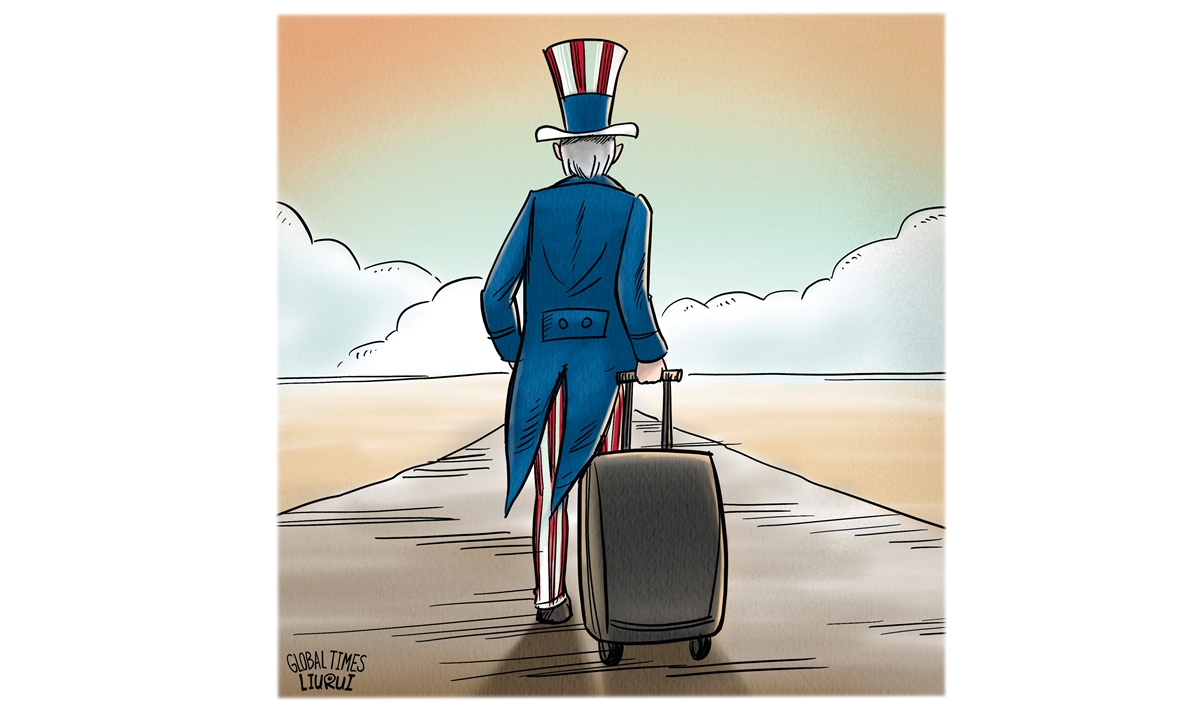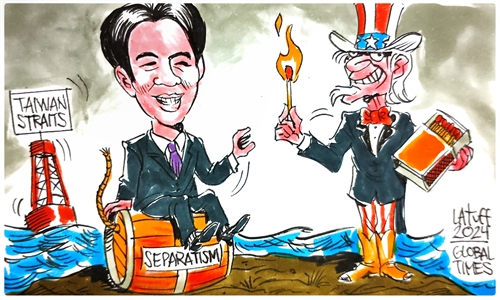
Illustration: Liu Rui/GT
Some Western media outlets have been raising the old debate lately about the US' "strategic ambiguity" on the Taiwan question, believing it was reawakened by the election of Lai Ching-te as Taiwan's regional leader.
Take Foreign Policy, which published an article last week, entitled, "America's Strategy of Ambiguity Is Ending Now," by columnist James Crabtree. Crabtree pointed out a critical fact - the US can no longer maintain the so-called strategic ambiguity in Asia-Pacific region, especially in the Taiwan Straits as it used to. Although the views raised in the article are as ambiguous as US strategy, the author has at least taken a vital step in the right direction: calling for a systematic discussion on US' "strategic ambiguity" on the Taiwan question.
Those who study US foreign strategy, especially the US strategy toward the Taiwan island, are well aware that the real issue has never been about "strategic ambiguity" or "strategic clarity," but whether the US still has enough resources to maintain its hegemonic system established after World War II.
If the answer is "yes," then finding ways to continue "strategic ambiguity" is a simple matter of technical and strategic adjustments. If not, the real discussion should not focus on "clarity" or "ambiguity," but how US hegemony can leave the Taiwan Straits with dignity. This means ensuring that there is no accidental conflict during the process of China's reunification and avoiding the so-called "domino effect" that could lead to a loosening of the US alliance system in East Asia.
The main drawback of Crabtree's article on US "strategic ambiguity" is the lack of historical observation on the process of how US hegemony in the Asia-Pacific region was established after the WWII. Analysts familiar with this history and those with basic common sense know well that for a considerable long period of time after the end of the WWII, the overwhelming power advantage the US had was the key to the US realizing "strategic ambiguity" in the Taiwan Straits as well as the key to forging a series of bilateral military alliances and regional security structure. In the 1980s, the changing power dynamics brought about by Japan's emergence posed the first challenge to the US. But the US, leveraging its own advantages and fully utilizing its control over Japan, systematically suppressed the threat from Japan with the signing of the Plaza Accord.
The real challenge the US faces now is not the apparent challenge from China, which is only an issue on the surface. The real problem lies in the domestic constraints on the US' own development dynamics. In the economic and financial field, the problem is the excessive expansion of US domestic financial capital. In the political and governance field, the problem is the rapid decline of the US government's governance capacity, the rapid deterioration of the vicious competitive electoral system, and the resulting political and social divisions. In the social and cultural field, the problem is the fragmentation of US society after the polarization of identity politics and the damage caused by the distorted development of consumerism to mainstream US ideology and values. Unless the US can solve these problems, whether it attributes the threats it faces to China or to Donald Trump, it may temporarily deceive the American people and win some transitional time. The tactic is ultimately destined to be ineffective.
Drawing on the experience of the late stages of the Vietnam War in the 1970s, seeking to leave Taiwan Straits with dignity should be an option for the US to consider seriously.
It should be clarified that a dignified leave specifically refers to the Taiwan Straits, and does not involve the US' military alliance systems in the Asia-Pacific region, as this is jointly determined by China's power structure and China's core characteristics of its foreign strategy.
For the US, the benefits of doing so are reflected in at least three aspects.
First, US getting away from Taiwan Straits could directly enable both China and the US to avoid the "Thucydides Trap" and no longer need to worry about a possible head-on collision over the Taiwan question. Reunification is China's core national interest, and US' clear support for peaceful reunification, as well as its policy to cease arming the island, will send a clear and unambiguous signal, allowing China-US relations to return to the track of benign development.
Second, it will help the US to reduce its negative strategic assets and truly gain the time needed for domestic structural adjustment and transformation. For the US, the pro-independence forces in Taiwan island are not a strategic asset worth long-term investment. Clear separation from these forces will give the US greater strategic initiative and help it pool resources on a benign adjustment of its global strategic layout. After China achieves peaceful reunification, it will focus more on internal governance, which is also good news, strategically speaking, for the US.
Third, it will remove a geopolitical uncertainty for the world. Looking back at the experience since the end of WWII, US' opportunities for development are usually obtained by removing geopolitical uncertainties for the world. For example, the breakthrough in China-US relations in the 1970s, and the decisive withdrawal from South Vietnam helped to limit the damage caused by the Vietnam War.
From China's perspective, if the US can turn away from the discussion on "strategic ambiguity" to an opportunity to explore a practical and rational way to get away from Taiwan Straits, it would be a clear and explicit strategic signal that is encouraging and fortunate for not only the US, but also China-US ties, East Asia region, and the world. It is hoped that US strategic decision-makers have the courage, ability and wisdom to make the right choices that are beneficial for the US, US' relations with China, and the world at such a historic moment.
The author is director of the Research Institution for Global Cyberspace Governance at Fudan University. opinion@globaltimes.com.cn

